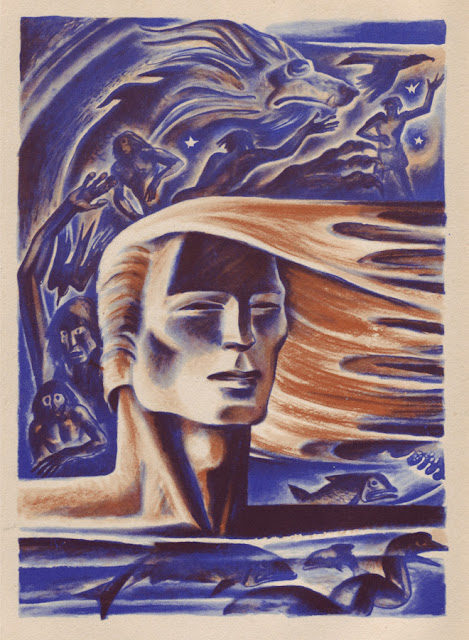Weird is a very old concept, possibly--or very probably--a pre-Christian concept. If we're going to talk about weird we must first understand it. I'm not sure that we can at this late date. Weird has come to us from a culture long departed from this earth. It is from a sensibility that may be alien to us, separated as we are from it, first by the intervention of the Christian era, afterwards by modernity and our embrace of science and reason. Or maybe it's not so alien, if an awareness of weird is in our eternal human nature.
In trying to understand the meaning of weird, not so much as a word as a concept, we might best go back to beginnings. For that, we have Beowulf, which dates from the early Middle Ages, was first spoken, then written, in Old English, and was finally committed to an extant manuscript at around the turn of the first millennium. If you're going to search for a word in a text, it's best to use a digital version of that text. In my search for weird in Beowulf, I have consulted a translation of the Heyne-Socin Text by Dr. John Lesslie Hall, Professor of English and History at the College of William and Mary in Virginia. Dr. Hall's work was published in 1892 by D.C. Heath & Company of Boston, New York, and Chicago. You will find his translation at the following URL:
https://www.gutenberg.org/files/16328/16328-h/16328-h.htm
* * *
In Dr. Hall's translation, the word weird occurs seven times, plus once in the glossary, where it is defined as: "Fate, Providence."
Here are the seven occurrences:
1. Beowulf speaks of what might happen to him in battle, even that he might die. In Part VII, Line 83, he acknowledges:
"Goes Weird as she must go!"
In other words, in Hall's annotations, "Weird is supreme."
And, in other words, Weird is personified--as a woman! She must be Urðr (Wyrd), one of the Norns.
2. In Part VIII, Line 22, Weird once again acts:
Weird hath offcast them to the clutches of Grendel.
3. In Part X, Lines 14-15:
[. . . .] Weird often saveth
The undoomed hero if doughty his valor!
Doughty means "brave and persistent." The implication here is that weird as fate is not always negative. Providence seems to be a better meaning of the word in cases like this one.
4. In Part XIV, Line 42:
Weird they knew not, destiny cruel,
meaning that the men knew not what cruel fate would befall them. Here a connection is made between cruelty, as in the much later conte cruel, and weird.
5. In Part XXXIV, Lines 27-33, are these remarkable words and images:
6. In Part XXXVIII, Lines 61-63, come Beowulf's last words:
 |
| An illustration for Beowulf by Lynd Ward (1905-1985). |
No comments:
Post a Comment